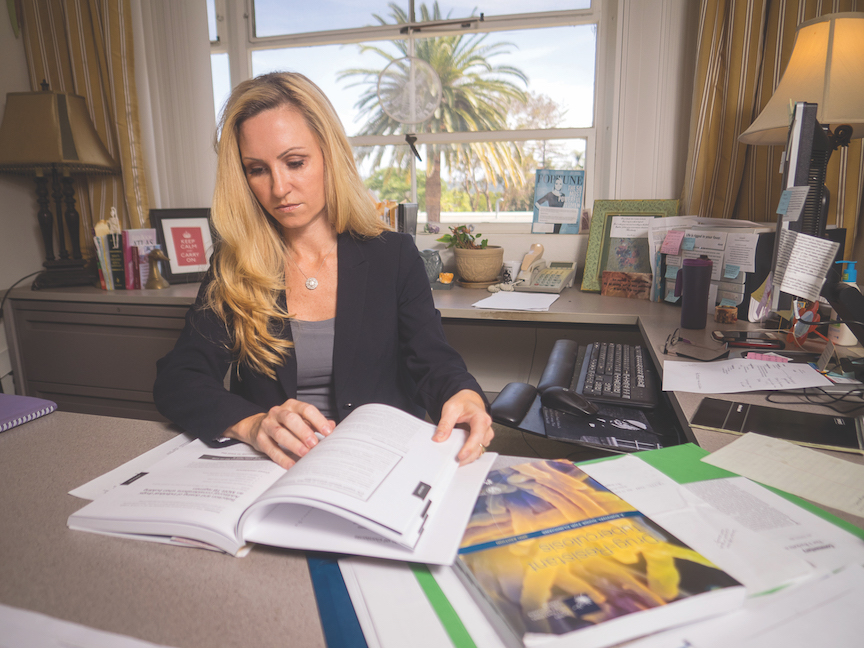
Months into the COVID-19 pandemic, Dr. Charity Dean realized a harsh reality.
She was then assistant director of the California Department of Public Health, and she knew the state and nation were literally in a do-or-die situation.
“As a local health officer, I learned painfully that no one is coming to save me,” Dean, who was Santa Barbara County’s public health officer from 2011-2018, told the Business Times in a recent email interview. “No capability for risk management of infectious disease existed at all for the private sector — there was no one to call for help.”
While she was struggling helping the state navigate through an unprecedented crisis, she saw countless businesses attempting to do the same without any help. In an effort to ensure that there is help in the future, Dean left state employment and co-founded The Public Health Company, which launched April 29.
The Santa Barbara-based health tech company has developed what it calls the first public-health-as-a-service (PHaaS) platform. The platform is meant to help businesses, health care providers and public health systems acquire the necessary data, practices and genomic epidemiology to prevent, detect, and contain disease outbreaks.
PHC launched with $8 million in seed funding led by Venrock, Verily, and Sweat Equity Ventures.
“What I saw running front-line public health disease control was a system that was a relic from the last century that hasn’t been transformed by the technology revolution the way other sectors have,” Dean said. “COVID-19 exposed that that is not just a problem for public health officials trying to contain disease, but a massive problem for the private sector that, up until COVID-19, relied on the government to mitigate their risk.”
Though widespread vaccinations across the United States have helped slow the spread of COVID-19, the danger of infectious diseases ravaging local communities, businesses and even whole states is still a threat that Dean and other health experts want to address.
“I think it’s become clear to everyone that every organization, and especially large employers, must have access to the tools and expertise to prevent and contain infectious disease risk,” Dean said.
Ed Tran, PHC’s senior public health nurse operations director, said the company’s platform combines local data published by public health departments along with data from its own clients. For example, in the case of COVID-19, some of that additional information could be the genomic data which could show which variants of the virus are being spread in which communities.
That data would then be passed to those who need it, like public health departments, along with guidelines to help stop the spread.
“It’s about quick identification and then quick response,” Tran said. “What happened with COVID was we weren’t able to contain it fast enough and it was spreading faster than we could contain it, but if we could quickly identify and implement interventions, then we would have succeeded.”
On June 15, California will reopen nearly its entire economy for the first time since the COVID-19 pandemic first hit. And while that is a good sign of how far medicine has advanced in just over a year, Tran said it is important that we don’t forget more diseases exist.
“For us as a company, the question is how do we prevent the next pandemic, the next COVID, because it’s going to happen,” Tran said. “We already see drug-resistant pathogens, we have seen diseases constantly jump from animals to humans, and variant mutations that continue to mutate. It just continues to happen so it’s critical we continue this surveillance and be prepared.”
Tran said PHC has made some “meaningful partnerships” in its first month as a company, but declined to elaborate.
PHC also would not disclose how much it is charging for the software platform, with Tran adding it is decided on a “case-by-case basis.”
Before joining PHC, Tran worked for the Santa Barbara County Public Health Department. He said one of the biggest reasons he left was because he wanted to empower public health systems through technology that has not previously been available.
“Public health as a system has been fragmented, has been under-resourced with staff and with dollars, so to help develop a platform and software that can help my former public service is why I joined the company,” Tran said. “I truly believe the tools that we’ve developed will help public health in disease control and containment for existing infectious disease and for future novel viruses.”
Dean has made headlines recently due to her role in the newest Michael Lewis book, “The Premonition.” In it, she is one of a select group of doctors and scientists who see the danger of COVID-19 and try, largely unsuccessfully, to warn federal and state governments about it.
Now, PHC’s goal is to more than just warn about a potential infectious disease danger. It hopes to contain it so that a pandemic at this level can be avoided in the future.
“My inescapable conclusion was that new technology had to be built for both private and public sectors,” Dean said. “The same Silicon Valley innovation that had revolutionized other sectors would need to be paired with the best disease prevention and risk experts, to create software capabilities that didn’t exist yet. … I am literally taking the same thinking, algorithms, risk calculations, and risk forecasting that goes on in the mind of a highly adept frontline disease controller, and putting it into software that scales, and making that accessible to any client (along with the expertise of PHC’s incredibly talented team).”






 Print
Print Email
Email

















